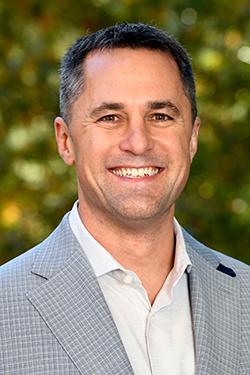
Research Topics
David M. Reif, Ph.D., joined the NIEHS in 2022 as Chief of the Predictive Toxicology Branch (PTB) in the Division of Translational Toxicology (DTT). In this role, he leverages expertise of the branch in data science, Artificial Intelligence (AI) and Machine Learning (ML), toxicogenomics, spatiotemporal exposures and toxicology, computational methods development, and new approach methods (NAMs) to advance predictive toxicology applications with partners across NIEHS, the interagency Tox21 Program and the Interagency Coordinating Committee on the Validation of Alternative Methods (ICCVAM).
Prior to joining NIEHS in 2022, Reif was a professor of bioinformatics at North Carolina State University, in the Department of Biological Sciences. His lab focused on integrated analysis of high-dimensional data from diverse sources to understand the complex interactions between human health and the environment and included trainees from degree programs in bioinformatics, genetics, toxicology, and statistics. Before North Carolina State University, David was a principal investigator (PI) with the U.S. EPA’s National Center for Computational Toxicology. His efforts in research, teaching, and outreach have been recognized with several honors, including the Presidential Early Career Award for Scientists and Engineers (PECASE), awarded by The White House as the highest honor bestowed by the United States government on science and engineering professionals in the early stages of their independent research careers. He has also been selected to serve on expert committees, including those for the National Academy of Sciences, the World Health Organization's International Agency for Research on Cancer, and the U.S. EPA Science Advisory Committee on Chemicals.
Biography
Reif earned his B.S. in biology (with a minor in finance) from the College of William and Mary, where he was a Monroe Scholar. He earned his M.S. in applied statistics and Ph.D. in human genetics from Vanderbilt University. He then completed postdoctoral training in exposure science and computational toxicology at the U.S EPA.
Selected Publications
- Fleming JF, House JS, Chappel JR, Motsinger-Reif AA, Reif DM. Guided optimization of ToxPi model weights using a Semi-Automated approach. Comput Toxicol. 2024;29.
- Green AJ, Truong L, Thunga P, Leong C, Hancock M, Tanguay RL, Reif DM. Deep autoencoder-based behavioral pattern recognition outperforms standard statistical methods in high-dimensional zebrafish studies. PLoS Comput Biol. 2024;20(9):e1012423.
- Motsinger-Reif AA, Reif DM, Akhtari FS, House JS, Campbell CR, Messier KP, Fargo DC, Bowen TA, Nadadur SS, Schmitt CP, Pettibone KG, Balshaw DM, Lawler CP, Newton SA, Collman GW, Miller AK, Merrick BA, Cui Y, Anchang B, Harmon QE, McAllister KA, Woychik R. Gene-environment interactions within a precision environmental health framework. Cell Genom. 2024;4(7):100591.
- Chappel JR, King ME, Fleming J, Eberlin LS, Reif DM, Baker ES. Aggregated Molecular Phenotype Scores: Enhancing Assessment and Visualization of Mass Spectrometry Imaging Data for Tissue-Based Diagnostics. Anal Chem. 2023;95(34):12913-12922.
- Thunga P, Truong L, Rericha Y, Du J, Morshead M, Tanguay RL, Reif DM. Utilizing a Population-Genetic Framework to Test for Gene-Environment Interactions between Zebrafish Behavior and Chemical Exposure. Toxics. 2022;10(12).
Related Scientific Focus Areas
This page was last updated on Thursday, September 11, 2025




